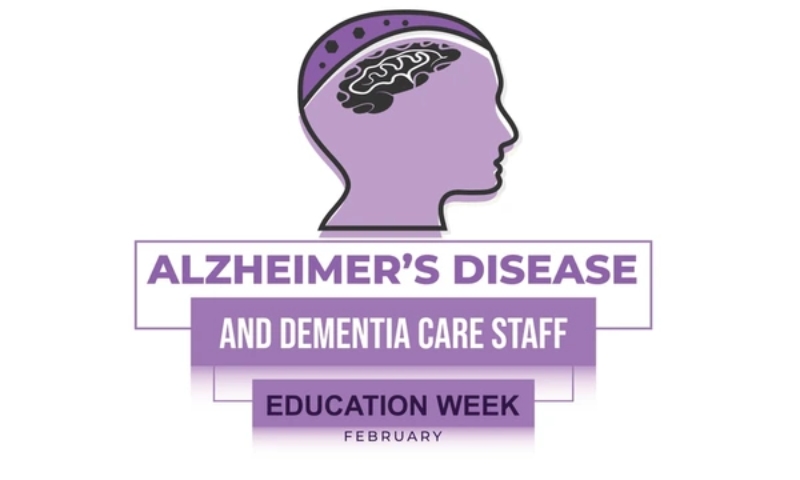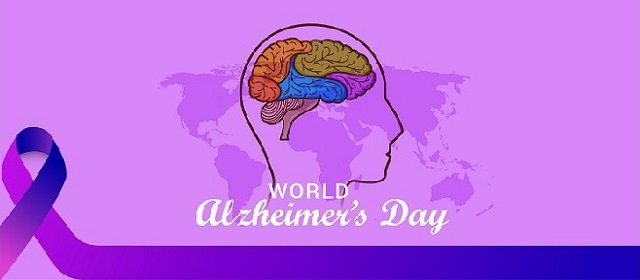Festivals & Events
Alzheimer’s Disease and Dementia Care Staff Education Week: History and Significance

February 14 to February 21 is Alzheimer’s and Dementia Care Education Week. The week-long celebration is organized by the National Council of Certified Dementia Practitioners to promote understanding and compassion for people who have been diagnosed with dementia. Throughout the week, front-line staff members receive training in new methods of communication and how to help patients with everyday tasks.
Every year, from February 14 to February 21, there is a staff education week on Alzheimer’s disease and dementia care. The general word for the progressive loss of cognitive function is dementia. The most common cause of dementia is Alzheimer’s disease, although it can also be caused by Parkinson’s disease, stroke, severe head injuries, and other conditions. This illness leads to brain atrophy, which impairs thinking and reasoning abilities, causes mood swings, causes memory loss, and makes it difficult to carry out daily tasks. Although there isn’t a cure for the majority of dementia cases, patients can live longer and have a better quality of life if they receive the right care and medication. To better assist patients with Alzheimer’s disease and dementia, this education week is devoted to educating medical professionals on cutting-edge methods and techniques.
Aiding in the coordination and promotion of developments in the treatment of dementia and Alzheimer’s disease is one of the week’s goals. Although there is reason for concern regarding the rise in dementia cases, there is also hope because there are increasingly effective treatments available to enhance the quality of life for individuals with dementia and Alzheimer’s disease.
Alzheimer’s Disease and Dementia Care Staff Education Week: History
Since at least 2007, the observance has raised awareness of the value of comprehensive dementia education on a national and international level. Providing all healthcare professionals and line staff with opportunities for face-to-face interactive classroom instruction is one of the week’s objectives. In the end, the organizers want to go above and beyond the bare minimum set by the state for dementia education.
Since 2007, there has been a week dedicated to raising awareness of dementia care and Alzheimer’s disease. The National Council of Certified Dementia Practitioners (N.C.C.D.P.) launched the initiative to raise awareness of the value of providing caregivers with a thorough education about dementia. It instructs medical personnel on the latest and most recent methods for caring for dementia patients.
Alzheimer’s disease is more common as people age, however, most patients don’t exhibit symptoms until they are in their 60s. Anger and difficulty carrying out daily duties are the initial symptoms. The symptoms may worsen into delusion, aggression, social withdrawal, etc. in the later stages.
For dementia and Alzheimer’s disease to be medically proven, a series of tests is necessary. These consist of CT, MRI, and PET scans. Thyroid and vitamin B-12 blood tests are also necessary. Based on these tests, doctors can provide a diagnosis and prognosis.
To get ready for what might happen in the future, the caregiver and the family of the diagnosed individual should attend appropriate education programs and join support groups. The goal of N.C.C.D.P.’s Education Week initiative is to raise awareness of the condition. It also seeks to increase awareness on a national and international level. It has been noted that dementia patients’ quality of life will increase quickly with improved training and education.
Since 2007, a week in February has been set aside by the National Council of Certified Dementia Practitioners (NCCDP) to increase public awareness of dementia and Alzheimer’s disease and to train caregivers on the best ways to care for patients with these conditions. Alzheimer’s and Dementia Care Education Week is February 14–21, 2024.
Importance of Awareness and Education
There are no national standards for dementia education, states the NCCDP. States have different regulations. Nonetheless, the general recommendation is that all employees complete at least eight hours of dementia education. It also suggests that all caregivers who meet the requirements become Certified Dementia Practitioners (CDPs). Additionally, it recommends that each work shift have a minimum of one CDP.
Alzheimer’s Disease and Dementia Care Staff Education Week: Purpose
- It reveals fresh developments.
Three to nine years are all that an individual with Alzheimer’s disease has left to live, according to Johns Hopkins School of Public Health researchers. However, the patient’s quality of life can be greatly enhanced with appropriate care and efficient treatment.
- Experiences can be shared within a community.
Caregivers can learn from one another and each other’s experiences during staff education week.
- It offers a toolkit that includes everything.
By giving healthcare professionals toolkits to help them navigate the situations they may encounter when caring for dementia patients, N.C.C.D.P. makes sure that Alzheimer’s Disease and Dementia Care Staff Education Week is a comprehensive program. This is really, really significant.
What is Dementia?
Progressive or ongoing loss of intellectual functioning, particularly with memory loss and difficulty thinking abstractly, is what defines dementia. It is also frequently accompanied by a change in personality brought on by an organic brain disease. Numerous particular illnesses are covered, such as the well-known Parkinson’s, Alzheimer’s, and Creutzfeldt-Jakob diseases. These disorders lead to a decline in cognitive abilities and frequently have a significant impact on daily life. They are caused by abnormal changes in the brain.
Even though it affects older adults more often, dementia is not a typical aspect of aging. Progressive loss of brain cells, brain tumors, head trauma, strokes, and other conditions are some of the causes of dementia that have been identified.
An estimated 47.5 million people worldwide are thought to have dementia, with a new case being diagnosed every four seconds, according to recent studies.
How to Celebrate Alzheimer’s Disease and Dementia Care Education Week
This week, staff members and their families can receive educational support from organizations across the country. Among the methods to take part are:
- Go to a training session.
- Volunteering.
- Find out what makes dementia different from Alzheimer’s.
- Acquire the ability to identify Alzheimer’s symptoms early on.
- Take part in memory-boosting activities like playing board games, learning a new language or instrument, solving crossword or number puzzles, and so on.
-

 Business3 weeks ago
Business3 weeks agoPrakash and Kamal Hinduja: Driving Social and Environmental Change
-
Education4 weeks ago
Fred DuVal: University Leadership as a Critical Resource for Climate Change Research and Life-Saving Solutions
-

 Health3 weeks ago
Health3 weeks agoThe Hinduja Brothers Commitment to Global Health: Empowering Communities Across Borders
-

 Cryptocurrency3 weeks ago
Cryptocurrency3 weeks agoDesigned For The Masses: How Akasha (AK1111) Is Unlocking Crypto For The Next Billion Users
-

 Cryptocurrency4 weeks ago
Cryptocurrency4 weeks agoNexaglobal & Future World Token (FWT): Could This Be the Next Big Crypto Investment of 2025?
-

 Sports4 weeks ago
Sports4 weeks agoWomen’s NCAA Tournament 2025 Sweet 16: Full Schedule, Fixtures, Teams, Bracket, and How to Watch March Madness Basketball Match Live
-

 Startup1 week ago
Startup1 week agoCost-Saving Strategies Every Small Business Owner Should Know to Boost Efficiency
-

 Startup3 weeks ago
Startup3 weeks agoMatthew Denegre on the Art of Deal Sourcing: Finding the Right Investment Opportunities














